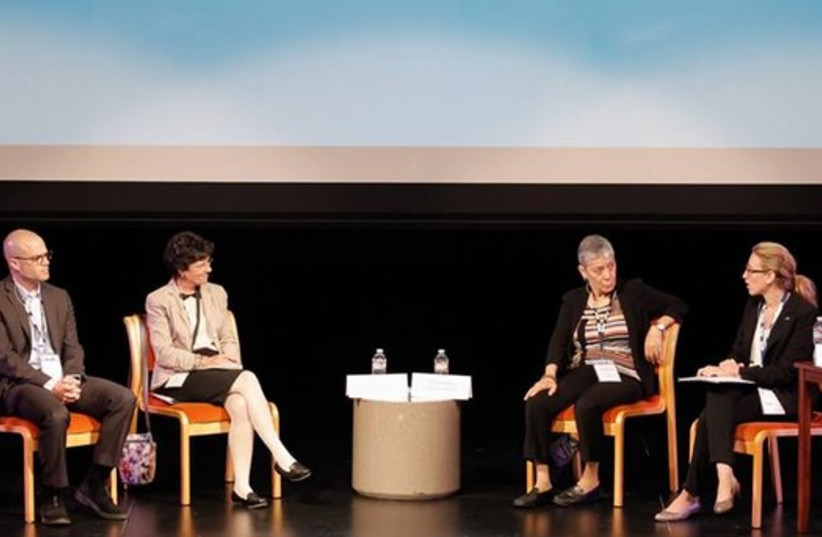Dear president of a J Street U chapter,
We met recently when I spoke at your synagogue. As our conversation was personal, I won’t mention your name, university or shul. Still, allow me to respond in this forum because the exchange was productive and illuminating.
First, thank you; I enjoyed the robust, respectful, hour-long discussion. We defied stereotypes by engaging substantively and calmly. I appreciate your openness, because you clearly didn’t like what I said. I was happy to clarify what I thought you misheard, and hear from you about where we still disagreed.
I call this “listening generously.” It’s rare these days – increasingly foreign to young and old, Left and Right. In fact, our conversation began testily because during my talk you “listened censoriously” – twisting what I said at the beginning once you didn’t like what I said toward the end.
I began by challenging the parents and grandparents there. I asked them to stop always asking every youngster they meet: “What are you going to do?” and “Where are you going to college?” – meaning, how will you make money? Our college-careerist obsession is particularly problematic considering how anti-Israel so many campuses have become.
We build them up as the most important places, making it easier for them to knock our kids down. More important, for good role-modeling and mensch-raising, let’s start asking: “Who are you going to be?” and “How is your soul doing?”

Somehow, you fused my use of the term “soul” with someone else’s attack claiming that you, as a J Streeter, lack a Jewish soul.
You misheard my “soul” challenge because you disliked my attack on the woke obsession with “white privilege.” I did not reject the phrase categorically. I acknowledged the persistence of racism. And I defined most bad ideas as originally good ideas that go all accelerator, no brakes.
Don't use the white privilege accusation for Zionism
I did, however, warn against using the “white privilege” accusation to make all whites defensive, falsely stereotyping all whites as “rich,” and defining people only by the color of their skin – not the content of their character, as Martin Luther King desired.
I believe the “white privilege” charge particularly demoralizes Jewish students, who want to be accepted as good progressives. While negating poor Jews, middle-class Jews, and Jews-of-color, this sloppy phrase neutralizes the toolbox Jews and other immigrant groups used to succeed in America.
If you only prospered because of “white privilege,” and America is systemically racist, then anyone Jewish or non-Jewish who lives well benefited from ill-gotten gains, not their smarts or their sweat.
Treating Israel as a bastion of “white privilege” tries shoving the complicated Middle East situation into a simplistic, Marxist, oppressor-versus-oppressed paradigm. And, poof, the Zionists become the bad guys – like all Jews.
You rejected my argument. First, you alluded to Palestinian students describing various Israeli crimes. Obviously, sometimes bad things happen to Palestinian people. But, it’s striking. Those of us traveling from campus to campus often hear similar descriptions of similar crimes Israeli soldiers “committed.” Many of these student activists have been trained to peddle imagined tales of woe to inflame naive students against Israel.
Second, you accused me of not understanding my “white privilege,” saying I have no idea what it’s like to walk down a street knowing that cops are hunting you down, even if unarmed. I hate to confuse popular punch lines with facts. But in 2022, 13.2% of police officers were black, in an America that is 12.1% black, making most police forces more representative than critics suggest.
Moreover, police mistakenly killed 35 unarmed blacks last year. That’s 35 too many. But with 46.8 million African-Americans in a country of 332.4 million, that’s a much lower percentage than Israelis killed by Palestinian terrorists, and it’s much, much lower than the murder rate in America’s most dangerous cities.
FINALLY, YOU charge that in championing identity Zionism, I ignored the Palestinian issue. In fact, I was trying to put our Israel conversation in context, rejecting Yasser Arafat’s conceit that every conversation about Israel and Zionism should be about him and his people.
Treating the Palestinian question proportionately is not ignoring Israel’s problems. But it does stop Palestinians and other Bash-Israel-Firsters from hijacking our Zionist conversation about us: about who we were, who we are, and who we want to be as free Jews living in our homeland.
By the way, your critique reveals my biggest problem with J Street. Beware its false advertising. Despite calling itself “Pro-Israel and Pro-Peace,” J Street’s obsession with the Palestinian issue, above all else, makes a mockery of its slogan, as does its soft spot for similar Palestinian enablers and obsessives.
To be “pro-Israel,” you have to support Israel when Iran threatens genocide, Hamas bombards Israeli cities, or members of Congress target Israel mindlessly. And to be “pro-peace,” rather than parroting so much Palestinian propaganda, you have to stand up and criticize Palestinian leaders for fomenting terrorism, demonizing Israel, and consistently rejecting any peace attempts.
At the risk of “Zio-splaining,” I will add that you struck me as less J Street and more of a progressive Zionist – an Israel-lover who criticizes Israel’s current government and seeks a two-state solution. Zionists occasionally criticize what Israel does, but they still celebrate what Israel is. Zionists consistently defend Israel rather than just bashing it.
And Zionists know how to identify those who consistently target the Jewish state, even while hiding behind blue-and-white rhetoric. Maybe it’s time to start a new club on your campus.
The writer is an American presidential historian and, most recently, the editor of the three-volume set Theodor Herzl: Zionist Writings, the inaugural publication of The Library of the Jewish People.
